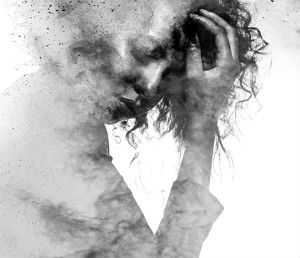We ask you, humbly: don't scroll away.
Hi readers, it seems you use Catholic Online a lot; that's great! It's a little awkward to ask, but we need your help. If you have already donated, we sincerely thank you. We're not salespeople, but we depend on donations averaging $14.76 and fewer than 1% of readers give. If you donate just $5.00, the price of your coffee, Catholic Online School could keep thriving. Thank you.Help Now >
The Secret Behind Depression
FREE Catholic Classes
Detecting depression caused by untreated childhood trauma may not always be easy, as memories can be blocked for childhood trauma. In fact, untreated childhood trauma may well be the secret behind depression as for many people, as memories can be blocked by such events or circumstances. Childhood trauma comes in many forms. It may be a one-time traumatic event that occurred in the past or an ongoing series of traumatic events that cause depression in a child. It may stem from growing up in a neglectful, abusive home, or from various forms of physical, sexual, mental or emotional abuse endured in one's youth. Either way, untreated childhood trauma can, and does, significantly impact one's health and wellness.
 Hi readers, it seems you use Catholic Online a lot; that's great! It's a little awkward to ask, but we need your help. If you have already donated, we sincerely thank you. We're not salespeople, but we depend on donations averaging $14.76 and fewer than 1% of readers give. If you donate just $5.00, the price of your coffee, Catholic Online School could keep thriving. Thank you. Help Now >
Hi readers, it seems you use Catholic Online a lot; that's great! It's a little awkward to ask, but we need your help. If you have already donated, we sincerely thank you. We're not salespeople, but we depend on donations averaging $14.76 and fewer than 1% of readers give. If you donate just $5.00, the price of your coffee, Catholic Online School could keep thriving. Thank you. Help Now >

43.8 million people will experience mental illness each year.
Highlights
Catholic Online (https://www.catholic.org)
3/5/2018 (6 years ago)
Published in Health
Keywords: depression, anxiety, PTSD, autoimmune, MS, Lupus, myasthenia, childhood trauma,
When depression continues for 3 weeks or longer, it is considered clinical depression, generally requiring professional intervention for healing. The untoward effects of underlying, untreated childhood trauma may be difficult to diagnose and treat, as even the person living with it may not be aware of the toll it is taking on them. Many people do not understand that the mind affects the body, and the reverse is true, the body affects the mind, as well. Depression may be prevalent and persistent, long-buried memories can be elusive - even blocked - as one engages in daily adult life.
According to the website for the National Association for the Mentally Ill, NAMI, the following statistics speak volumes about the nature of mental illness such as depression:
• 1 in 5 Americans, or 43.8 million people, will experience mental illness each year.(NAMI)• 21.4% will experience mental illness in their lifetime.• 18.1% will have Post-traumatic Stress Disorder (PTSD) or another anxiety disorder.• Of the 20.2 million Americans experiencing substance abuse, 50% have a co-occurring mental illness. • 80% of young adults who suffered abuse and/or neglect in childhood are diagnosed with at least 1 psychiatric disorder by the age of 21.
Oftentimes, people can pinpoint what is bothering them when they have depression and can get the help they need. Yet, other times, as is the case with untreated childhood trauma, an individual may be fully unaware of the cause of their persistent depression, even after seeking out professional help. In those cases, it takes a keen eye to assess the reason for the depression, so the individual can seek out effective treatment, a plan can be put into place, and implemented that will provide relief from the uncomfortable feelings of sadness.
The good news is that for most people who receive effective treatment, including psychotherapy and/or medication, depression is a very treatable mental illness. With timely, effective treatment, most people can go on to resume relationships with friends and family, return to doing the things they previously enjoyed, and live in peace and contentment. Exercise, taking walks, prayer, practicing positive thinking, eating healthy, socializing, staying busy, having hobbies, and staying connected with friends are all common, effective personal strategies for good physical and mental health.
Adapted from the new inspirational self-help book, "From Broken to Blest: Embracing the Healing that Awaits You," by Adele M. Gill and Dr. Verna Benner Carson, now available on Amazon.com and Barnes & Noble.com in print and ebook.
(C) Copyright 2018 | Distributed by News Consortium
---'Help Give every Student and Teacher FREE resources for a world-class Moral Catholic Education'
Copyright 2021 - Distributed by Catholic Online
Join the Movement
When you sign up below, you don't just join an email list - you're joining an entire movement for Free world class Catholic education.
-

-
Mysteries of the Rosary
-
St. Faustina Kowalska
-
Litany of the Blessed Virgin Mary
-
Saint of the Day for Wednesday, Oct 4th, 2023
-
Popular Saints
-
St. Francis of Assisi
-
Bible
-
Female / Women Saints
-
7 Morning Prayers you need to get your day started with God
-
Litany of the Blessed Virgin Mary
California Teens Win $1 Million Lawsuit Against Catholic School Over Misinterpreted Blackface ...
-

Why Do We Celebrate the Feast of the Ascension of Jesus? What Does it Mean?
-

Encouraging Scripture for the Single Mom on Mother's Day
-
Three things that should be in every Catholic home - How many do you have?
-
New York Judge Halts Constitutional Amendment on Abortion Due to Procedural Flaws
Daily Catholic
 Daily Readings for Friday, May 10, 2024
Daily Readings for Friday, May 10, 2024 St. Damien of Molokai: Saint of the Day for Friday, May 10, 2024
St. Damien of Molokai: Saint of the Day for Friday, May 10, 2024 Prayer to St. Gabriel, for Others: Prayer of the Day for Friday, May 10, 2024
Prayer to St. Gabriel, for Others: Prayer of the Day for Friday, May 10, 2024- Daily Readings for Thursday, May 09, 2024
- St. Pachomius: Saint of the Day for Thursday, May 09, 2024
- Prayer for Travelers: Prayer of the Day for Thursday, May 09, 2024
![]()
Copyright 2024 Catholic Online. All materials contained on this site, whether written, audible or visual are the exclusive property of Catholic Online and are protected under U.S. and International copyright laws, © Copyright 2024 Catholic Online. Any unauthorized use, without prior written consent of Catholic Online is strictly forbidden and prohibited.
Catholic Online is a Project of Your Catholic Voice Foundation, a Not-for-Profit Corporation. Your Catholic Voice Foundation has been granted a recognition of tax exemption under Section 501(c)(3) of the Internal Revenue Code. Federal Tax Identification Number: 81-0596847. Your gift is tax-deductible as allowed by law.









 Daily Readings for Friday, May 10, 2024
Daily Readings for Friday, May 10, 2024 St. Damien of Molokai: Saint of the Day for Friday, May 10, 2024
St. Damien of Molokai: Saint of the Day for Friday, May 10, 2024 Prayer to St. Gabriel, for Others: Prayer of the Day for Friday, May 10, 2024
Prayer to St. Gabriel, for Others: Prayer of the Day for Friday, May 10, 2024

